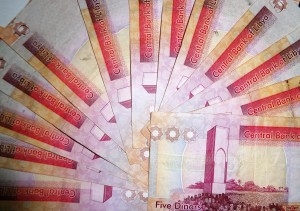By Libya Herald reporter.

Malta, 15 January 2015:
The Central Bank of Libya (CBL) is secretly considering introducing deep economic measures in an . . .[restrict]effort to put a halt to Libya’s spiralling deficit and the burning of what remains of the US$ 130 billion foreign currency reserves that the new Libyan political order had inherited from the Qaddafi regime.
The Libyan state is currently operating without a budget as a three-way political and military tug of war goes on between its two contending political factions on one hand, and the CBL on the other, for who has the ultimate authority to spend Libya’s reserves. No budget is expected to be introduced before March.
The CBL has refused to release any money for the last budget except for wages and subsidized goods. The only internationally recognized government of Abdullah Thinni, for example, is operating through a loan it has obtained from a local Libyan commercial bank.
It is believed that Libya has already used up US$ 40 billion since the February 2011 revolution to make up for the shortfall in oil revenues caused initially by the 2011 war effort, but subsequently by both industrial and political blockades on oil production and exports.
The renewed fighting since 2014 between the pro General National Congress (GNC) / Libya Dawn faction and the House of Representatives (HoR) / Karama faction has also affected oil production and exports, which currently hover around the 300,000-500,000 bpd mark.
Libya’s dire economic situation has been compounded by its political fragmentation, but also worsened by the 60-odd percent fall in international crude oil prices since their peak in the summer of 2014.
This fall in crude oil prices would have meant that even if Libya was producing its pre 2011 maximum of around 1.5 million barrels per day, its national revenues would have still had a huge shortfall. Two thirds of Libya’s budget goes to state sector salaries and subsidies of electricity, fuel, foods and medicines.
In reality, Libya will be lucky if it earns anything between LD 15-20 bn in 2015 if international crude prices remain between US$ 40-50 pb – not enough to even pay its state-sector salary commitments.
It is believed that the controversial austerity measures will involve huge cuts in the payment of state-sector salaries domestically and abroad, the ‘’sacking’’ of local and consular employees appointed illegally after the revolution, and huge cuts in subsidies.
The austerity measures are believed to be so explosive that both sides in Libya’s political divide are reluctant to be associated with them and it is believed that it is the CBL that is pushing for them and is prepared to accept the blame for their unpopularity if their introduction was to backfire.
It is believed that the Ministries and Authorities at the top of the list for drastic austerity cuts are the Defence, Health and Foreign Ministries as well as the National Supply Company responsible for the purchase of Libya’s subsidized foods.
The job cuts believed to be planned for the Defence Ministry are expected to cut the pay of many militias with great concerns as to the political and military blowback from such a move.
However, both the GNC and the HoR are also believed to be earmarked for cuts to many employees they have taken on that are deemed illegal appointments.
A committee is believed to be going through all the appointments of personnel across the entire state sector since the 2011 revolution to ensure that they have all followed procedures, standing rules and laws on state sector job appointments.
In effect, the plan is considering the payment of only 50 percent of current salaries in all sectors and a freeze on all wage increases within Libya in all sectors.
This will go hand in hand with a freeze on all new job appointments as well as the reversal of all illegal job appointments, again across all sectors of the state bureaucracy.
But beyond illegal new job appointments since 2011, the plan seeks to stop all salaries to legally appointed state sector workers who have been regularly absent from work.
These are employees who have either never turned up to work, such as what are referred to as ‘’phantom’’ employees who are either dead, or never existed, or hold more than one job, or live in another location and holding another job.
The plans to whittle out phantom employees are expected to include the use of the National ID Number – a move that has met with huge militia and bureaucratic resistance since 2011.
Furthermore, the plans discussed also include the retrospective docking of the pay of absentee employees in order to refund the state for all the days of work they had missed.
The diplomatic and consular sector of Libya, a very well paid strata of employees paid in hard currency abroad, are also believed to be very high on the austerity target.
The degree of corruption in the illegal appointment of state-employees at Libya’s consular and diplomatic missions has apparently reached astronomical figures, with Libya’s missions in London and Cairo believed to be two of the worse examples.
Unofficial and unconfirmed figures indicate that the number of employees at Libya’s Cairo embassy, for example, have rocketed from 35 employees to 1,500 employees, while London’s from 13 to 1,342 since 2011.
The overwhelming majority of these employees do not turn up for work at the embassies and many are believed to spend most of their time outside of the UK or Egypt, turning up only to collect their salaries. Many of their fellow embassy employees have never heard of them nor ever seen them.
| Prior to 2011 revolution | Post 2011 revolution | |
| Number of employees in Libyan embassy Cairo | 35 | 1,500 |
| Number of employees in Libyan embassy London | 13 | 1,342 |
*Unofficial figures
State sector employees generally, however, have also mushroomed from 477,690 prior to 2011 to 2,625,038 in 2014 with the state sector salary bill rising from LD 7.5 bn pre 2011 to LD 28.4 bn in 2014.
| State sector employees total | Prior to 2011 revolution | Post 2011 revolution |
| 477,690 | 2,625,038 | |
| Total state sector employees salary bill | LD 7.5 bn | LD 28.4 bn |
Fuel subsidies have also rocketed from LD 12.8 bn prior to the 2011 revolution to LD 23.9 in 2014. A large proportion, some estimate as high as a third, of this subsidized fuel is smuggled to Libya’s neighbouring states and is instrumental in increasing crime, illegal migration, drug and arms smuggling.
| Fuel subsidies | Prior to 2011 revolution | Post 2011 revolution |
| LD 12.8 bn | LD 23.9 bn |
A litre of petrol in Libya, for example, retails at LD 0.15 (Euro 0.8 per litre /US$ 0.12 per litre at official exchange rates) whereas it retails at ten times that price in neighbouring Tunisia. Tunisia is one of the top destinations for smuggled Libyan fuel.
| Registered number of bakeries | Actual operating bakeries | |
| Bakeries | 104,201 | 3,032 |
The same economic logic can be applied to the flour subsidy, with a standard Libyan baguette retailing at the government set price of LD 0.05 compared to a baguette in Tunisia retailing at one Libyan dinar.
Unofficial figures indicate that while there are on paper 104,201 bakeries receiving their quota of state subsidized flour, in reality during the recent bread shortages only 3,032 bakeries were found to exist.
It is believed that most of the distributed subsidized flour is either being sold domestically on the black market to cake and pastry manufacturers, or smuggled abroad to Libya’s neighbouring states.
It is worth keeping in mind that these austerity measures are still under discussion and are not policy yet. Already this week one side started backtracking on its previous announcement that salaries might need to be cut. The politicians are very weary of an adverse public reaction – a public that is heavily armed.
However, if these austerity cuts planned by the CBL do receive the political approval from either or both the contending political factions of Libya, they will quite literally be revolutionary.
The Libyan public has for four decades been used to living in a ‘’nanny’’ state where oil revenues have been used to subsidize citizens from the cradle (there is no charge at government maternity wards) to the grave (there is no burial charge in state grave yards).
Cutting salaries, jobs, food, bread and fuel and electricity subsidies is never popular in the most established of states – let alone in a newly born democratic state still going through its transition stage.
It will be interesting to see what the general public reaction will be to any austerity measures introduced. However, Libya, with its drop in oil production and exports and the world collapse in crude oil prices, has run out of options. It has no alternative sources of revenue and has to make drastic cuts.
However, with the political split that is currently threatening to rip the country apart, neither side of the political divide is taking leadership of the austerity measures. They are not being sold to the general public and when or if they are introduced suddenly will come as a huge shock to many Libyans. [/restrict]









